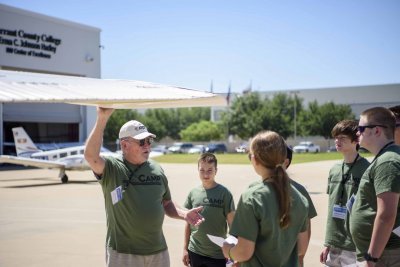
Ten years ago, The University of North Texas, on the recommendation of the North Texas Council of Governments (NTCG), devised a curriculum that would later become one of the best degree programs in the country.
Home to major facilities of the two largest airfreight companies, Dallas-Fort Worth (DFW) seemingly had their aviation and transportation needs fully supported. What it lacked behind the scenes, however, was a proper supply of qualified employees to enter into the field.
NTCG saw this as a unique opportunity, and in 2008, approached higher education institutions to address one of the most crucial areas of growth in companies throughout Texas (and the US): Aviation. The regional shortfall soon became one of UNT’s strengths, as the G. Brint Ryan College of Business was the only college willing to take on the task.
Dr. Steve Swartz, the college’s program director in 2010, wrote the state-of-the-art curriculum that incorporated a unique, but necessary approach on the aviation industry—business logistics.
Building upon its nationally-recognized logistics program, this aviation degree would focus on the 85% of employment opportunities in the aviation industry that are not found in the cockpit or cabin. From supervision and dispatch, to maintenance, marketing, and pricing and scheduling theory, UNT’s aviation degree quickly developed into a one-of-a-kind program that attracted a myriad of talent and interest.
“The program really stirred up some interest, among not only students and employers, but also industry professionals who wanted to teach in the program,” explained Tim Kincaid, an aviation degree program instructor with 25+ years of corporate background, including 16 with American Airlines. He learned of UNT’s newly minted degree 10 years ago. Kincaid fondly remembers “stalking” the program in hopes of getting an offer to teach in the program.
Steve Joiner, industry veteran and former officer and pilot for the US Marine Corp, was also eager to join the program and has remained an integral faculty member since its inception in 2010.
“I was always wondering why there wasn’t more business focus on the aviation industry, because it’s so wide and so diverse—but every time you would look at something on aviation, it surrounded a pilot program,” recalled Joiner.
The program’s unique position, coupled with its talent and interest, became a driving force for its growth—bringing together top-tier faculty from around the country, as well as nationally recognized brands vying for partnership opportunities.
“Airline companies are businesses and they’ve got all the business functions,” explained Dr. Terrance Pohlen, the college’s current associate dean and former logistics program director. “That really made us unique in the market place… and it really solidified our partnerships, especially with Southwest Airlines.”
Southwest Airlines’ headquarters, located just forty minutes south of campus, has become one of the program’s most influential partners. Offering a steady pipeline of internship and career placements, hosting the college’s annual scholarship breakfast, and providing complimentary travel for student teams participating in national competitions (of which the program has received numerous first-place awards), are just a few of the ways Southwest has expanded student opportunities.

Career Education Academy (ACE) camp, a collaborative
program offered to high school students by UNT and TCC.
Southwest has not been the only partner to transform the program over the years either. American Airlines, Envoy Airlines, and area airports such as the Denton Airport and Alliance Fort-Worth Airport have also served an important role. This is also true for Tarrant County College (TCC) and its pathway for transforming two-year associate’s degrees and pilot’s licenses into four-year degrees at UNT.
Military prospects, in particular, have seen the benefits of earning their aviation logistics degree from UNT and have enabled further program growth.
“It’s formed a pipeline for students wanting to go into the military and particularly those who want to become military pilots,” said Pohlen.
Pilots are required to earn a four-year degree, making aviation logistics a compelling choice among prospective military enrollees. As added incentive, the four-year degree also gives pilots piece of mind knowing that the potential for medical disqualifications will not end their career.
“Many people that go into the flight-side of the aviation industry often have a medical disqualification where they can no longer be a pilot, but with a business degree, and that experience, they can find another job in the aviation industry,” explained Pohlen.
Approaching a 100% placement rate, students are comforted knowing that their hard-earned degree will get them not just a piece of paper, but a reliable, secure and fulfilling career once they graduate. Often attributed to the program’s required internship component and its exceptional partnerships, more students choose UNT for these transformative opportunities.
“Having a required internship in both our aviation and logistics programs is a tremendous differentiator,” said Pohlen.
Recently ranked first in the country for median earnings for alumni after graduation by GradReports.com, has brought earning potential to the forefront for prospect students, too.
Ten years later, UNT’s aviation logistics degree remains the only four-year aviation logistics program in the country—and the captivating enthusiasm that first grew the program still, to this day, remains palpable throughout classroom and beyond.
---
To learn more about UNT’s Aviation Logistics degree program, please visit: https://www.unt.edu/academics/undergrad/aviation-logistics




